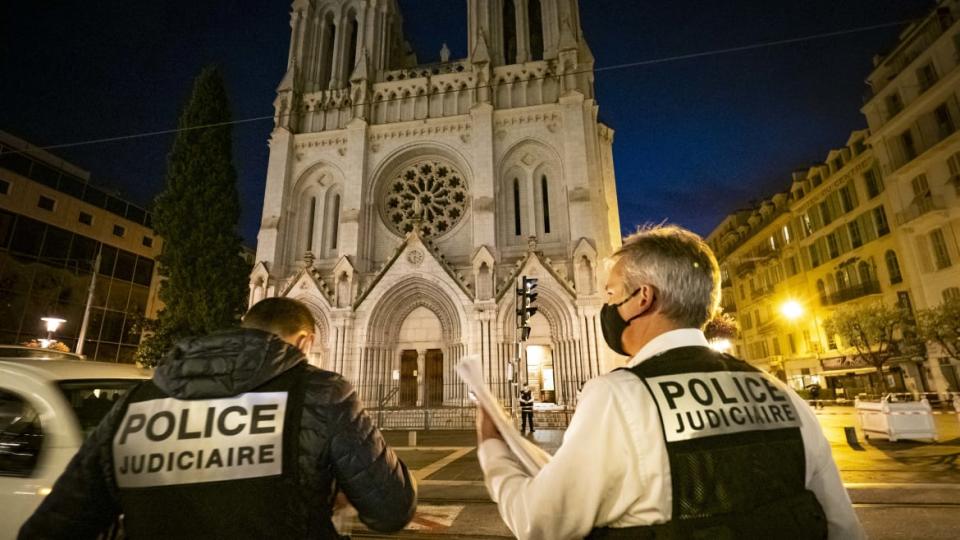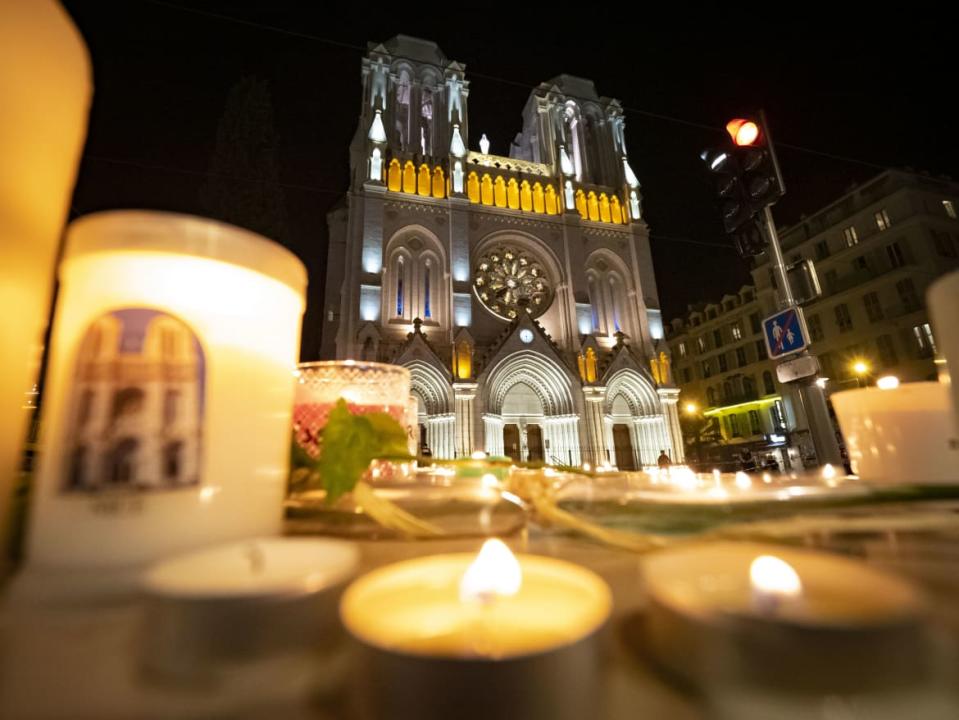France Rattled By Gruesome Terror Attacks and Second COVID Lockdown

PARIS—Before the killings began, Nice’s largest church was quiet and nearly deserted.
Vincent Loqués opened the Basilica of Notre-Dame at 8:30 a.m. as usual. The landmark cathedral, a striking bone-white structure, was built in the mid-1860s in the Neo-Gothic style and sits on Nice’s Avenue Jean Médecin—a busy artery in the city center lined with cafes and shops. The 55-year-old Loqués worked there as a sexton for the past 10 years, and his duties included welcoming visitors and worshipers when the church opened.
One such worshipper was 44-year-old Simone Barreto Silva. The Brazilian-born mother of three had lived in Nice for decades and had come to the basilica for a morning prayer session.
Minutes later, a knife-wielding young man entered the church and began attacking those inside, stabbing both Loqués and Silva. Loqués died at the scene, but Silva was able to stagger to a nearby cafe before collapsing and dying from her injuries.
Woman Beheaded in French Knife ‘Terror’ Attack at Church, 3 Dead
A third woman, who has yet to be identified, reportedly suffered such a fearsome blow to the neck that she was practically decapitated.
Police have identified the attacker as Ibrahim Issaoui, a 21-year-old Tunisian migrant who reportedly arrived in Europe in September. Law enforcement sources told the French press that Issaoui landed on the Italian island of Lampedusa, where he was placed in quarantine before being ordered to leave Italy. He is believed to have entered France earlier this month and was not known to French intelligence services. Earlier today, authorities also arrested a 47-year-old man who is suspected to have been in contact with Issaoui the night before the attack.
CCTV cameras captured the suspect at Nice’s main train station, where he changed clothes and then walked to the neighboring basilica to begin his rampage. Police arrived less than a half-hour later and shot Issaoui, who was carrying a copy of the Quran and shouting “Allahu Akbar” (God is greatest). He was taken into custody and remains in the hospital in critical condition.
The gruesome attack has shaken France and bears an eerie similarity to the horrific killing of history teacher Samuel Paty, who was beheaded in the Paris suburb of Conflans-Sainte-Honorine two weeks ago.
Paty was murdered after he shared images of cartoons of the prophet Muhammad—considered blasphemous in the Muslim faith—during a lesson on free speech at the middle school where he taught. His attacker was identified as Abdoulakh Anzorov, an 18-year-old Chechen man who drove some 50 miles to the site with the intent of murdering Paty. He was shot and killed by police.
Prior to Paty’s killing, a young man armed with a meat cleaver stabbed and injured two people outside the former offices of Charlie Hebdo as the trial was getting underway for the alleged accomplices of the deadly 2015 attack on the satirical magazine.
The killings in Nice come on the heels of another nationwide lockdown following an explosion of COVID-19 cases in France in recent weeks and add to the stress and uneasiness that has gripped the country since the virus began spreading across Europe in late winter.

People pay tribute at night in front of Notre Dame Basilica on October 29, 2020 in Nice, France
Footage of armed police descending on the cathedral evoked memories of 2015 and 2016, when a series of terrorist attacks in France killed some 230 people. Eighty-six of the victims died on Nice’s famed Promenade Anglaise when a Tunisian national drove a truck into a packed crowd of Bastille Day revelers.
“France is under attack,” President Emmanuel Macron said during a statement outside the basilica Thursday. “If we have been attacked once again, it is because of our values, our taste for freedom; the freedom to believe freely and not yield to any terror.”
Macron also said that he would deploy thousands more soldiers to protect important sites such as places of worship and schools, and the government has since raised the security alert in France to “emergency attack level”—the country’s highest.
Although Issaoui’s exact motive is not yet known, tensions have been running high in the country since the opening of the Charlie Hebdo trial. The magazine marked the occasion by reprinting caricatures of the prophet Mohammad, sparking a debate on free speech and stoking anti-French sentiment in parts of the Muslim world. And as the country vows to crack down on terrorism, it is left grappling with how to deal with radical Islam without alienating its Muslim population.
The attack in Nice has also incited worry among the country’s Muslims, who fear such acts stigmatize them and sow division. Moreover, Macron’s recent campaign against what he terms Islamic “separatism,” and the hardline comments by some members of his government—Interior Minister Gérald Darmanin called Muslim extremism “the enemy within”—have left many Muslims feeling as though their faith, not the jihadists, is being targeted.
Leila, a longtime Muslim resident of Nice who runs a bakery with her husband, told RFI about the suspicious looks she received on the tramway just after the attack.
“A man sat down next to me,” she recalled. “And a woman asked him if he was afraid of having his throat cut.”
The killings in Nice may or may not be related to extremist fury over the Muhammad cartoons, but there is also another element at play. Since March, the coronavirus pandemic has taken center stage in the national consciousness and has emerged as the country’s most pressing worry. However, the latest string of attacks has served as a sobering reminder that while terrorism was no longer at the forefront of national concerns, it remains a threat to public safety.
Back in August, the French Minister of the Armed Forces, Florence Parly, addressed the press during a visit with anti-terrorist forces in Lyon.
“The virus doesn’t take a vacation,” she said. “And neither does the threat of terrorism.”
Some analysts have gone further to say that the arrival of the virus has spurred a resurgence of radical and extremist groups in Europe. The global pandemic, they argue, has enabled such groups to take advantage of the crisis as both a way to spread their ideology and as a recruitment tool.
In an editorial published in May by the European Policy Centre, a Brussels-based think tank, Ivano di Carlo writes that the effect of the health crisis on the economy—the loss of jobs, the ensuing stress, the growing social inequalities—coupled with lockdown and sense of isolation “make for fertile ground for extremist recruiters,” who use the internet to spread their agenda and target new members.
“Confinement can accelerate extremist behaviors when aggravated by other emotional factors,” he writes. “Counter-extremism practitioners have warned that the increased time spent online by people in lockdown presents an opportunity for extremist cells to recruit vulnerable individuals through online platforms.”
Just two days after France went into lockdown for the first time on March 17, the so-called Islamic State outlined a strategic plan in its official newsletter that called on followers to exploit the virus’ toll on the global economy and state resources by launching more strikes on the West.
The “last thing they [Western countries] want today is that during these trying times, the caliphate soldiers will prepare to hit them like they hit Paris, London, Brussels and [other] cities,” the document reads, as cited in a report by the International Institute for Counter-Terrorism.
Di Carlo concurs that in addition to setting the stage for further radicalization, the COVID-19 crisis is stretching government resources to tackle extremism.
“Countering radical and violent ideologies remains a significant challenge for Europe,” di Carlo writes. “However, there is a risk of the COVID-19 crisis drawing attention away from this threat and reducing the prevention and countering of violent extremism, including financial support for programs, due to the pandemic’s massive economic and social impact.”
French terrorism expert Jean-Charles Brisard made similar comments in an interview with Le Figaro in April of this year, saying that the Islamic State was using the health crisis to its advantage, assuming that the pandemic would shift global priorities away from the fight against terrorism.
“The Islamic State is hoping to take advantage of the ‘paralysis’ of Western countries to reestablish its operational capacities in the area and incite its followers to plan and prepare attacks in Western countries,” he said.
On Thursday night, a vigil was held outside the illuminated basilica in Nice, where locals gathered to honor the three victims who died there.
“I came here to prove that not all young Muslims are like that,” Mohamed Gouasmi, 28, told L’Express. “In my religion, to kill a human being is to kill all of humanity.”
Several hours later, after everyone had gone home and the candles had burned out, France began its second lockdown.
Get our top stories in your inbox every day. Sign up now!
Daily Beast Membership: Beast Inside goes deeper on the stories that matter to you. Learn more.

